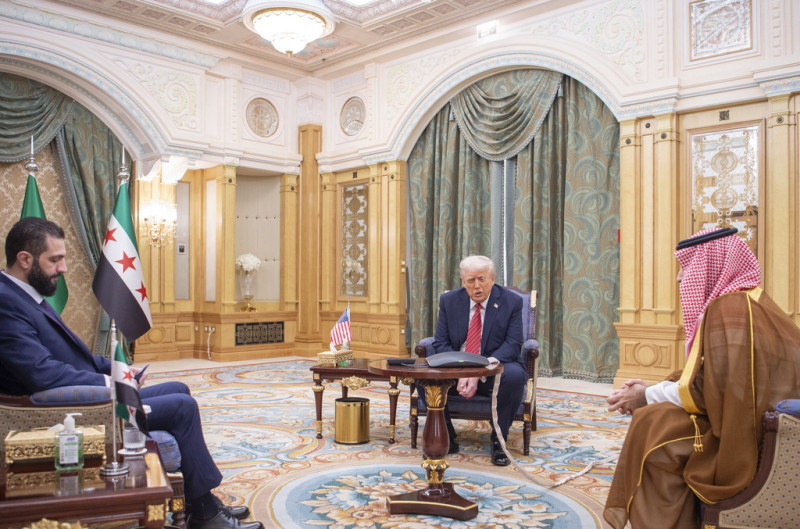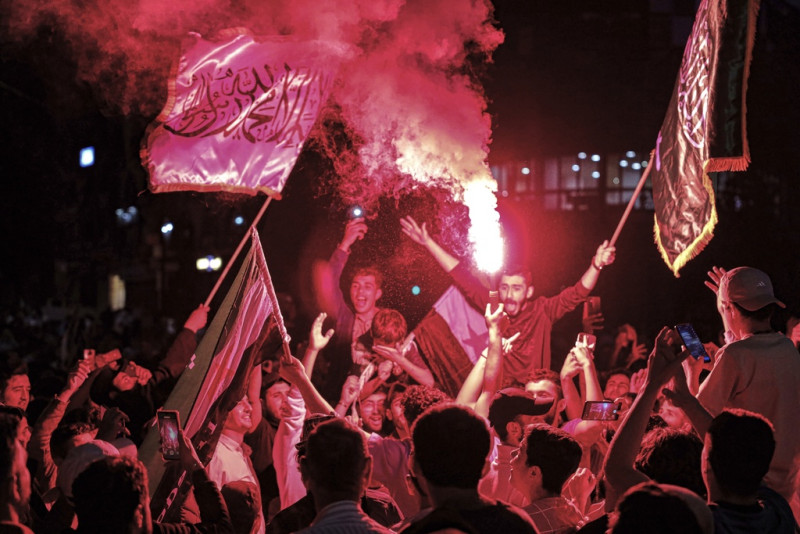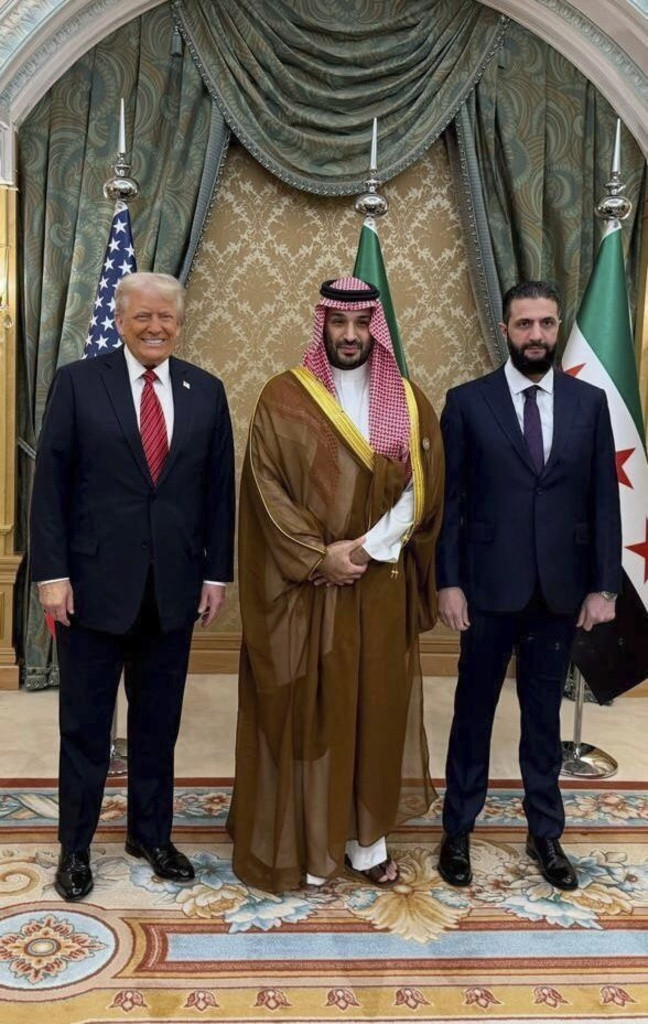Gulf states eagerly want to invest in Syria and support its economy – Tramp traffic lifts obstacles, paving the way for reinstatement to the international community
The meeting of US President Donald Trump with the new Syrian transitional president, Ahmed al-Saraa, a former jihadist and until recently wanted for terrorism, marks a deeply geopolitical reversal in the Middle East.
Syrian transitional president Ahmed al-Saraa, formerly known as his nickname Abu Mohammed al-Tzolani, met with Trump in Riyadh six months after the rapid campaign that led to the overthrow of the Assad regime, to the Asand’s regime.
Al-Saraa was included in 2013 on the list of Specifically defined world terrorists US for its leadership in Al Qaeda’s offshoot in Syria, known as al-Nusra front, and had been approved for $ 10 million.
The former jihadist, born in Saudi Arabia, had fought US forces in Iraq for many years before going to Syria to lead the armed Islamic uprising that overturned dictator Bashar al-Assad.
The meeting, described by Syria as “historical”, was the first between the president of the United States and the President of Syria for 25 years and was held during Donald Trump’s tour of the Middle East, the first official visits during his second term.
Both leaders appeared smiling in photos released by the White House and the Saudi Foreign Ministry. The Syrian Foreign Minister said Trump pledged to “stand by Syria at this critical juncture”.
One day earlier, Trump had announced the removal of many years of sanctions against Syria, a decision that caused a prolonged 40 -second applause from the audience and the warm applause of Saudi Arabic Prince Mohammed Bin Salman.
“Oh, what am I doing for the Prince successor,” Donald Trump told the room, attributing the credit to Saudi Arabia’s de facto leader to remove sanctions he described as “harsh and paralytic”. Syria has been registered by the United States as a “supporter of terrorism” since December 1979.
The Syrian economy has been hit by western sanctions for many years. The stricter includes the 2019 American “Caesar Law”, which imposed extensive sanctions banning people, companies or governments from being involved in any economic activity that could support Assad’s war mechanism. This law essentially made the entire Syrian economy “inaccessible”. According to the World Bank, the Syrian economy shrunk over 50% between 2010 and 2020.
By 2022, poverty hit 69% of the Syrian population, according to the same figures. Extreme poverty affected more than one in four Syrians in 2022, a percentage that, as the World Bank notes, probably worsened after the devastating earthquake of February 2023.
Gulf states are eager to invest in Syria and support its economy, but so far they have hesitated not to violate US sanctions. The Trump Movement is expected to lift these obstacles, paving the way for billions of dollars.
During the meeting, Trump suggested Saraa to take a number of measures, including normalizing relations with Israel, the expulsion of foreign and Palestinian “terrorists”, and the US to prevent the re -emergence of ISIS, according to the White House.
Syrian’s exit from isolation offers a lifeline to the newly established regime of the country and its president, who had committed to an interview with CNN last year that the Syrian armed opposition plans to form a government based on institutions and a “council”. However, this development also offers opportunities to the states of the Arab Gulf and Turkey, which had also pushed to remove sanctions, to expand their influence in Syria and benefit financially after decades of exclusion.
“The fact that he did so publicly from Riyadh, I believe, is a tacit approval for those who are thinking of investing in Syria,” said Natasa Hall from the Middle East program of the Center for Strategic and International Studies (CSIS). “(This) means that he gives victories to Mohammed bin Salman.”
Restrained optimism from Syrians
Syrians welcomed the lifting of sanctions with increased expectations. Bengal illuminated the sky in some of Syria’s largest cities following Trump’s announcement of sanctions. Advertising signs were set up with thanks to Trump and Prince Mohammed.
“I do not know what life is without sanctions is,” said Ranim Sacchal, who said she has been living in sanctions since she was born in the 1970s. “The country suffocates”.
“People are optimistic and our dream is for the Arab countries to help, something we have not seen for years because of Bashar’s rivalry with Arab leaders,” he added.
The Syrian currency, the pound, rose up to 27% against the US dollar after the announcement. The country’s Economy and Trade Minister, Mohammad Nidal al-Shaar, broke out live in the air on the Saudi television network Al Arabiya, stating that Syria “is now entering a new phase”.
But optimism is not universal. The lifting of sanctions may significantly contribute to the provision of legalization to the new Saraa regime, and some in Syria are concerned about how minorities will be addressed by former jihadists.
“We are happy … thank God. After so many years the economy can be rejuvenated. Prices are very high, the products are difficult to find, so first, God will be the beginning of economic improvement in the country, “a CNN resident of Damascus told the CNN. However, he added that the removal of sanctions should not be perceived as a tacit acceptance of the regime unless justice is given to those involved in minority murders.
“We are facing a number of extremist groups that limit freedoms,” he noted. “If a man and a woman appear publicly together, the man can be arrested and just disappear. Men can be beaten because they wear shorts … It is an extreme violation of personal freedoms. “
In March, armed loyalists in the new Syrian regime performed executions and talking about the “clearance” of the country when operations against Assad regime residues evolved into a community massacres against the Alawitian minority. The UN had then stated that entire families, including women and children, were murdered during the violence.
An opportunity for Saudi Arabia
For decades, the states of the Arab Gulf had been ruled out by Syria, as their opponent, Iran, expanded his influence in the country through his alliance with Assad.
The 10 -year civil war in Syria has caused a strong crisis in Damascus’ relations with the most Arab states, eventually leading to its exclusion from the Arab League. In recent years, however, the Gulf states have begun to restore their relations with Assad and have led to the effort to restore it until its sudden departure from power in December. Since then, Saudi Arabia and Qatar have intensified efforts to reintegrate the new regime to the international community.
Saudi Foreign Minister Faisal bin Farhan has announced Wednesday that Riyadh will be “at the forefront” of Syria’s economic recovery. His efforts could make Saudi Arabia an important player in the country, allowing her to expand her influence for the first time.
“Syria will not be left alone. Saudi Arabia … will be at the forefront of those who support this economic awakening … (Syria) needs a boost, and will receive it from its brothers in the area, “Bin Farhan at a press conference on Wednesday.
Hassan Alhassan, a senior researcher at the International Institute of Strategic Studies, noted that Saudi Arabia has “geostrategic interests in the Middle East” which can serve through the support of this Syrian regime.
Defying Israel
During the Biden government, the United States and Saudi Arabia were close to reaching an overall security and economy agreement, which would lead to normalizing Ryad’s relations with Israel.
Despite Trump’s desire to recognize Saudi Arabia, Israel, during his visit to Riyadh, such a move was not achieved. On the contrary, the president announced that he would conclude relations with Saraa – a move that is contrary to Israeli aspirations, which has repeatedly bombed Syria and occupied more territories after Assad’s fall.
An Israeli official told CNN that when Prime Minister Benjamin Netanyahu met with Trump in Washington in April, he asked him not to lift sanctions against Syria, expressing fears of repetition of the events of October 7th.
Netanyahu had adopted a harsh attitude towards Saraa and his new government. In the days that followed Assad’s overthrow, he ordered an unprecedented landfill within Syria, leading the Israeli forces deeper into the country than ever in the past, thus overturning the 50 -year silent peaceful coexistence of Israel with Assad.
This escalation marked the abandonment of Netanyahu’s commitment to “good neighborhood” with New Syria. Hundreds of air raids targeted what was left of the Assad arsenal, especially its chemical weapons, in order to prevent them from being occupied by extremist organizations.
Israeli forces occupied Mount Hermes, the highest peak of Syria and a strategic point with views of Israel, Lebanon and Syria.
“We overturned the Assad regime, which was essentially functioning as a land link between Iran and Hezbollah in Lebanon,” Netanyahu said in a video message last week.
After meeting with Saraa on Wednesday, Trump praised him publicly, describing him as a “extraordinary, young and charming man” with a “very strong past” as a “fighter”. The new Syrian president, he said, “really has an opportunity to do it.”
Source :Skai
With a wealth of experience honed over 4+ years in journalism, I bring a seasoned voice to the world of news. Currently, I work as a freelance writer and editor, always seeking new opportunities to tell compelling stories in the field of world news.













